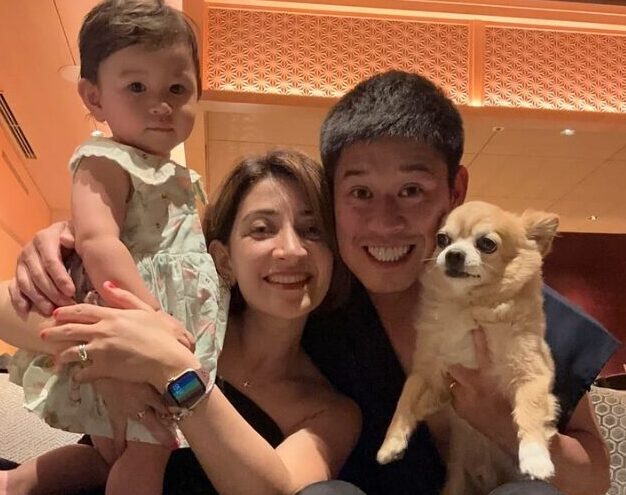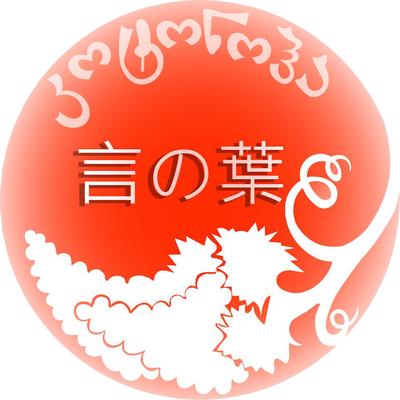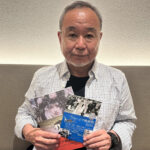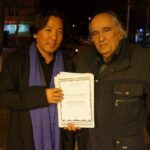【Profile】
She Lives in Kyoto. Studied at Doshisha University under the Japanese Ministry of Education, Culture, Sports, Science, and Technology (MEXT) program. Gained work experience as a (shrine maiden) at Kodai-ji Temple, at a Georgian restaurant in Osaka, and at the Kyoto Economic Center. During this time, she married a Japanese man and had a daughter, Moana.
―― What motivated you to study Japanese? You studied at Doshisha University through the MEXT (Ministry of Education, Culture, Sports, Science, and Technology) scholarship program. What was your study period and the stages like?
Inaba Mariami :
I studied Japanese as my major for four years at Tbilisi Free University. After graduating, I worked for a year at a company that dealt in used cars. We purchased cars from Japan, and I was responsible for checking their condition.
After that, I decided to try the MEXT research student program exam. The exams included tests in Japanese and English, as well as an interview. Although I was nervous during the interview, I believe I answered the questions confidently. I passed successfully and was given the opportunity to go to Japan for a three-year study course. At that time, I had to send my documents to the desired universities myself, and I remember sending them to as many universities as possible. In the end, I received responses from five universities, including Doshisha University.
To be honest, I wanted to go to Tokyo, but if I hadn’t ended up at Doshisha University, I wouldn’t have met my husband Kōsuke. So, ultimately, I’m happy that I ended up at Doshisha University. Japan was my first experience abroad. Getting a Japanese visa was also one of my dreams, and participating in the MEXT program helped make that dream come true.

――Do you have any advice for Georgian students who wish to study at a Japanese university through the MEXT program?
Inaba Mariami :
In fact, I applied for the 5-year MEXT program when I was a first-year student, but it was very challenging. The exams included subjects like mathematics, which were not my strong points. I also applied for the 1-year “Nikkensei” program in my third year but unfortunately did not pass. I attempted the MEXT program exams twice and failed both times, but knowing the exam structure and having experience with document preparation played a significant role in eventually being accepted into the MEXT research program.
As advice, I would say that it’s crucial to keep trying until you achieve success. Taking the exam multiple times gives you experience and reduces nervousness. It’s also important that the documents you submit are prepared correctly and meticulously. I’m not sure how it is now, but in my time, the documents had to be handwritten, and I had to rewrite them every time I made a mistake. Therefore, it’s important to carefully consider and organize your text before writing it.
――How was your experience studying at Doshisha University?
Inaba Mariami :
In my first year of studying, I felt like I was in paradise. I attended Japanese language classes and spent time with other students, which helped me learn about Japanese culture. However, starting from the second year, I faced difficult and grueling research work that required constant studying.
To begin research at the university, I had to pass an exam where I had to answer questions about my research topic in Japanese. After that, I had an interview. The interviewers were knowledgeable about Georgia, including Pirosmani, so the conversation was quite engaging. Ultimately, I successfully passed the exam and began my research process. By that time, my friends from the first year had already returned home, and I was the only one left. There were also lectures on Shinto and Islam, but they were conducted in English, so that wasn’t a problem. However, in other Japanese-language lectures, there were many words I didn’t understand, so I had to make every effort to keep up. Eventually, with the help of Kosuke, whom I was seeing at the time, I managed to complete my master’s thesis in Japanese.
――you worked in Georgia on importing Japanese cars and then at Kyoto Sangyo 21. Did you find it challenging to find a job in Japan?
Inaba Mariami :
During my studies, I worked as an English teacher on the side. After completing my master’s degree, I started working as a guide at Kodai-ji Temple in Kyoto. At that time, finding a job in Kyoto as a foreigner was very challenging. With the help of Kosuke’s acquaintances, I found a job at Todai-ji Kemple and worked there for six months. Although I faced some difficulties working as a foreigner, it was still a highly valuable experience.
After that, I worked at a Georgian restaurant called Slow’s Delicious in Osaka. I started this job through an acquaintance I had met in Tokyo. I prepared Georgian food for about a year and a half. It was a significant experience, and in the future, I really hope to open my own Georgian restaurant.
After that, I worked for three years at the Kyoto Industrial Center. Again, I found out about the job through someone I met during my time as a student abroad, went through an interview, and successfully obtained the position.
I found jobs through the help of people, and I believe such connections are very important. In my opinion, having contacts and building relationships is crucial for foreigners seeking employment in Japan.
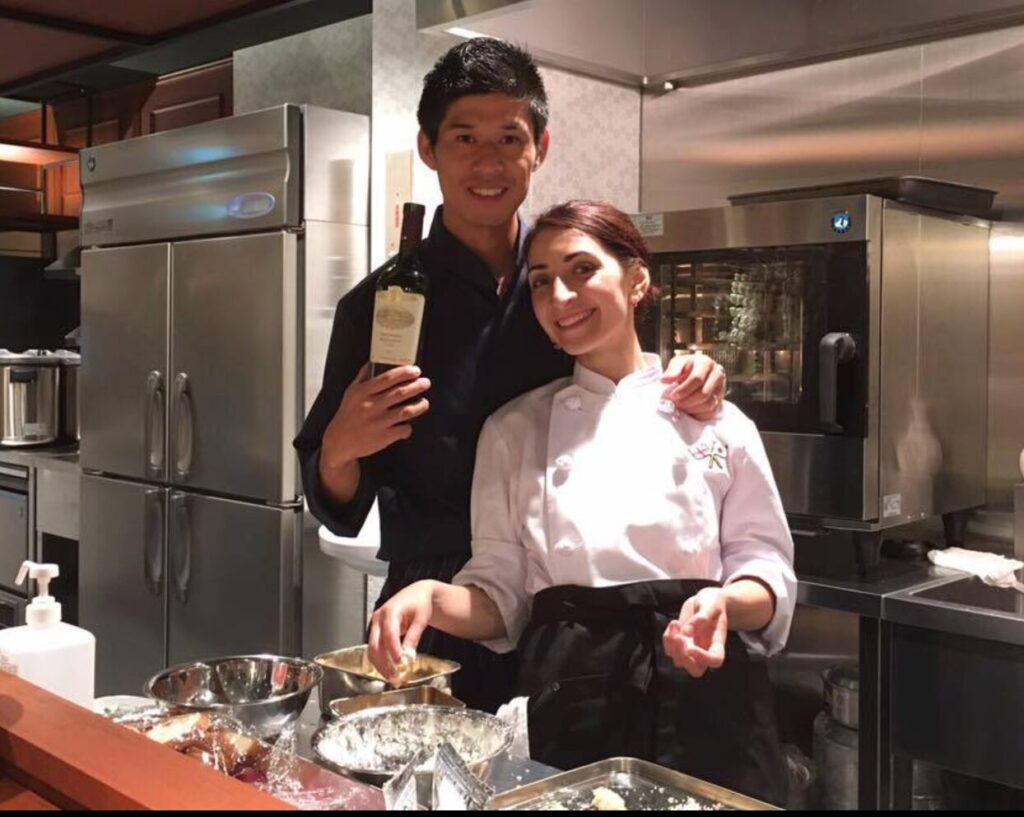
――Do you have any advice for Georgians who want to work in Japan?
Inaba Mariami :
I think the most important thing is to have a strong desire and motivation to work in Japan. Finding a job in a foreign country, especially in Japan, can be challenging. Therefore, it is crucial to clearly define what you want to do and what you are capable of doing, and then focus on doing what you can. In my case, I had an attitude of trying out various opportunities if they were available, to explore different fields and understand what I was good at and what I enjoyed doing.
So, I worked in an Italian restaurant and a ramen shop. Connections are also important. I believe that working in various places helps you build new connections, which can assist you in finding a job.
It is very important to understand that the business cultures of Japan and Georgia are different. In Japan, email communication is quite common and popular, unlike in Georgia. In Georgia, business matters are more frequently discussed directly over the phone using apps like WhatsApp, which do not leave written records. However, a positive aspect for Georgia is that things tend to progress quickly.
When I was working in Japan, I always placed great importance on the desire to learn and develop. If I didn’t understand something, I would immediately ask questions and strive to improve. I believe that such an attitude is also very important for career advancement and growth.
――Mariam, you have managed to share Georgian culture in Kyoto up to now. What activities do you plan to undertake in Kyoto in the future?
Inaba Mariami :
When I was working at the Georgian restaurant, even though it was a challenging time, it was also the period when I felt the most excited. I made decisions about the tableware and interior decoration myself and changed the menu several times. When a guest told me that the dishes I prepared were delicious, I was the happiest person at that moment. Therefore, I hope to open my own restaurant in the future.
When I was working at the Georgian restaurant, even though it was a challenging time, it was also the period when I felt the most excited. I made decisions about the tableware and interior decoration myself and changed the menu several times. When a guest told me that the dishes I prepared were delicious, I was the happiest person at that moment. Therefore, I hope to open my own restaurant in the future.
I am also considering bringing handmade items from Georgia and selling them in Japan. Next time I return to Georgia, I want to try bringing a few items to Japan and see if I can sell them.
The Georgian ambassador Lejava is actively working to promote Georgia in Japan, primarily in Tokyo. He told me as a joke that I should be the ambassador for Georgia in Kansai. In 2023, I had a daughter named Moana. I want to actively engage in and continue promoting Georgian culture in Kyoto.
